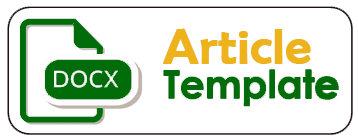Focus & Scope
Jurnal Intersections , provides a forum for publishing the original research articles, review articles from contributors, and the novel technology news related to mathematics education. This journal is provided for writers, teachers, students, professors, and researchers, who will publish their research reports or their literature review articles (only for invited contributors) about mathematics education and its instructional. Start from Agustus 2016, this journal publishes two times a year, in Februari and Agustus. Besides regular writers, for each volume, the contents will be contributed by invited contributors who experts in mathematics education either from Indonesia or abroad
The journal invites original research articles and not simultaneously submitted to another journal or conference. The whole spectrum of research in mathematics education are welcome, which includes, but is not limited to the following topics:
- Realistic Mathematics Education (RME)
Realistic Mathematics Education (RME) is a teaching and learning theory in mathematics education that was first introduced and developed by Freudenthal. Two of his important points of views are mathematics must be connected to reality and mathematics as human activity. RME is implemented following three principles, they are:
(1) guided reinvention and progressive mathematizing,
(2) didactical phenomenology, and
(3) self-developed model. Furthermore,
the practice of RME also has its own characteristics, they are:
(1) phenomenological exploration or the use of contexts,
(2) the use of models or bridging by vertical instruments,
(3) the use of students own productions and constructions or students contribution,
(4) the interactive character of the teaching process or interactivity, and
(5) the intertwining of various learning strands. A paper is eligible to be included in this topic if the paper accommodates these three principles and these five characteristics.
- Design Research in Mathematics Education
Educational design research is perceived as the systematic study of designing, developing and evaluating educational interventions (programs, teaching-learning strategies and materials, products, systems) as solutions to such problems. It also aims at advancing our knowledge about the characteristics of these interventions and the processes to design and develop them. Authors could submit their work, either a validation study or a development study in mathematics education, with a comprehensive description and analysis of every stage.
- Mathematics Ability
Mathematics ability refers to the ability (a human construct) to obtain, to process, and to retain mathematical information (cognitive) and to solve mathematics problem (pragmatic). To maintain the focus of this journal, the scope of mathematics ability includes the following abilities: reasoning, connection, communication, representation, and problem-solving. A paper is eligible for this topic if it comprehensively discusses those abilities.





